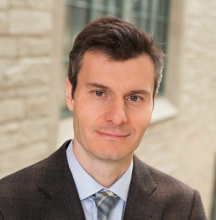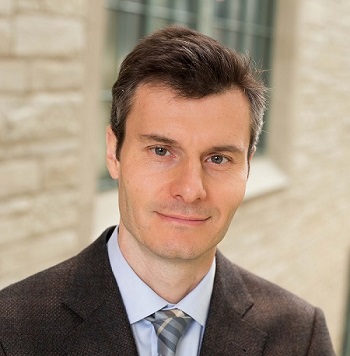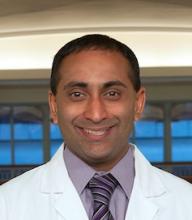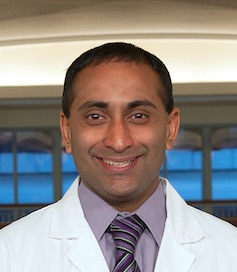User login
Nanotechnology breakthroughs envisioned for gastroenterology diagnostics and therapeutics
Nanotechnology is positioned to bring fundamental changes to the diagnosis and treatment of GI diseases, according to the Vadim Backman, MS, PhD, professor of biomedical engineering at the McCormick School of Engineering, Northwestern University, Chicago.
“The ways in which nanotechnology will change the field are going to be quite significant,” Dr. Backman said. He will give the Keynote Presentation at the 2018 AGA Tech Summit, sponsored by the AGA Center for GI Innovation and Technology. He described progress toward breakthroughs in diagnostics – particularly early detection of GI cancers – and therapeutics, such as nanocage transport of drugs across cell membranes. Applications have moved beyond the theoretical.
Nanotechnology is a broad term that involves manipulation of any material on a nano scale, often defined, although not strictly, as less than 100 nanometers (nm). Most bacteria measure more than 1000 nm in at least one direction. A DNA nucleotide is 2 nm. In the diagnosis and treatment of human diseases, the advantages of working on a nanoscale mean opportunities to act on the most fundamental molecular processes, including the earliest stages of pathophysiology.
In diagnosis, nanotechnology has the ability to detect genetic and epigenetic distortions that are initial steps to carcinogenesis. One set of studies has been performed with partial-wave spectroscopic microscopy capable of quantifying the properties of cellular structures on a scale as low as 20 nm. Work in this area has already successfully identified events in neoplasia development that preceded any alteration detected by conventional techniques, such as histology.
“With nanoscale sensitive optics, it is now possible to detect changes in cell and tissue structure that we have connected to the earliest steps in tumorigenesis,” Dr. Backman said. This work largely derives from progress in defining the topography of chromatin, a term that encompasses the protein, DNA, RNA, and protein composition of chromosomes. The work is relevant to all solid tumors, not just GI cancers. Based on the current status of the science, Dr. Backman foresees not just detection of the earliest events in cancer development but opportunities to tailor epigenetic therapies for personalized medicine.
In regard to other opportunities to improve diagnostics in GI diseases through nanotechnology, Dr. Backman spoke of nanoscale constructs that serve as contrast agents to visualize molecular structures and processes. These can be delivered endoscopically or systemically to provide unprecedented 3-D imaging, allowing such structures as cell receptors to be visualized and labeled.
The potential therapeutic applications of nanotechnology involve new approaches to altering disease progression. In addition to explaining the novel opportunities provided by delivering drugs on a nanoscale to alter cell processes in a way that would not be otherwise possible, Dr. Backman described how nanotechnology can be applied to influence global patterns in gene transcription. This is achieved by altering the chromatin structure.
“It is now understood that chromatin acts like software in mediating gene activities,” Dr. Backman explained. “In the case of cancer, normalization of chromatin structure can predictably modulate global patterns of gene expression. There is now evidence that modulation of chromatin structure with macrogenomic engineering may address cancer as well as other illnesses.”
In most cases, the advances described by Dr. Backman are not speculations based on the potential of the technology but concepts that are actively being developed. Partial-wave spectroscopic microscopy, which was developed in Dr. Backman’s laboratory, is permitting the nuclear nanostructure in live cells to be evaluated in real time, while progress in epigenetics is explaining which processes might be candidates for preventing or treating disease.
“Nanotechnology is positioned to advance personalized medicine and tailored therapeutics,” Dr. Backman said. “We do not yet have applications ready for regulatory approval, but they are coming.”
Nanotechnology is positioned to bring fundamental changes to the diagnosis and treatment of GI diseases, according to the Vadim Backman, MS, PhD, professor of biomedical engineering at the McCormick School of Engineering, Northwestern University, Chicago.
“The ways in which nanotechnology will change the field are going to be quite significant,” Dr. Backman said. He will give the Keynote Presentation at the 2018 AGA Tech Summit, sponsored by the AGA Center for GI Innovation and Technology. He described progress toward breakthroughs in diagnostics – particularly early detection of GI cancers – and therapeutics, such as nanocage transport of drugs across cell membranes. Applications have moved beyond the theoretical.
Nanotechnology is a broad term that involves manipulation of any material on a nano scale, often defined, although not strictly, as less than 100 nanometers (nm). Most bacteria measure more than 1000 nm in at least one direction. A DNA nucleotide is 2 nm. In the diagnosis and treatment of human diseases, the advantages of working on a nanoscale mean opportunities to act on the most fundamental molecular processes, including the earliest stages of pathophysiology.
In diagnosis, nanotechnology has the ability to detect genetic and epigenetic distortions that are initial steps to carcinogenesis. One set of studies has been performed with partial-wave spectroscopic microscopy capable of quantifying the properties of cellular structures on a scale as low as 20 nm. Work in this area has already successfully identified events in neoplasia development that preceded any alteration detected by conventional techniques, such as histology.
“With nanoscale sensitive optics, it is now possible to detect changes in cell and tissue structure that we have connected to the earliest steps in tumorigenesis,” Dr. Backman said. This work largely derives from progress in defining the topography of chromatin, a term that encompasses the protein, DNA, RNA, and protein composition of chromosomes. The work is relevant to all solid tumors, not just GI cancers. Based on the current status of the science, Dr. Backman foresees not just detection of the earliest events in cancer development but opportunities to tailor epigenetic therapies for personalized medicine.
In regard to other opportunities to improve diagnostics in GI diseases through nanotechnology, Dr. Backman spoke of nanoscale constructs that serve as contrast agents to visualize molecular structures and processes. These can be delivered endoscopically or systemically to provide unprecedented 3-D imaging, allowing such structures as cell receptors to be visualized and labeled.
The potential therapeutic applications of nanotechnology involve new approaches to altering disease progression. In addition to explaining the novel opportunities provided by delivering drugs on a nanoscale to alter cell processes in a way that would not be otherwise possible, Dr. Backman described how nanotechnology can be applied to influence global patterns in gene transcription. This is achieved by altering the chromatin structure.
“It is now understood that chromatin acts like software in mediating gene activities,” Dr. Backman explained. “In the case of cancer, normalization of chromatin structure can predictably modulate global patterns of gene expression. There is now evidence that modulation of chromatin structure with macrogenomic engineering may address cancer as well as other illnesses.”
In most cases, the advances described by Dr. Backman are not speculations based on the potential of the technology but concepts that are actively being developed. Partial-wave spectroscopic microscopy, which was developed in Dr. Backman’s laboratory, is permitting the nuclear nanostructure in live cells to be evaluated in real time, while progress in epigenetics is explaining which processes might be candidates for preventing or treating disease.
“Nanotechnology is positioned to advance personalized medicine and tailored therapeutics,” Dr. Backman said. “We do not yet have applications ready for regulatory approval, but they are coming.”
Nanotechnology is positioned to bring fundamental changes to the diagnosis and treatment of GI diseases, according to the Vadim Backman, MS, PhD, professor of biomedical engineering at the McCormick School of Engineering, Northwestern University, Chicago.
“The ways in which nanotechnology will change the field are going to be quite significant,” Dr. Backman said. He will give the Keynote Presentation at the 2018 AGA Tech Summit, sponsored by the AGA Center for GI Innovation and Technology. He described progress toward breakthroughs in diagnostics – particularly early detection of GI cancers – and therapeutics, such as nanocage transport of drugs across cell membranes. Applications have moved beyond the theoretical.
Nanotechnology is a broad term that involves manipulation of any material on a nano scale, often defined, although not strictly, as less than 100 nanometers (nm). Most bacteria measure more than 1000 nm in at least one direction. A DNA nucleotide is 2 nm. In the diagnosis and treatment of human diseases, the advantages of working on a nanoscale mean opportunities to act on the most fundamental molecular processes, including the earliest stages of pathophysiology.
In diagnosis, nanotechnology has the ability to detect genetic and epigenetic distortions that are initial steps to carcinogenesis. One set of studies has been performed with partial-wave spectroscopic microscopy capable of quantifying the properties of cellular structures on a scale as low as 20 nm. Work in this area has already successfully identified events in neoplasia development that preceded any alteration detected by conventional techniques, such as histology.
“With nanoscale sensitive optics, it is now possible to detect changes in cell and tissue structure that we have connected to the earliest steps in tumorigenesis,” Dr. Backman said. This work largely derives from progress in defining the topography of chromatin, a term that encompasses the protein, DNA, RNA, and protein composition of chromosomes. The work is relevant to all solid tumors, not just GI cancers. Based on the current status of the science, Dr. Backman foresees not just detection of the earliest events in cancer development but opportunities to tailor epigenetic therapies for personalized medicine.
In regard to other opportunities to improve diagnostics in GI diseases through nanotechnology, Dr. Backman spoke of nanoscale constructs that serve as contrast agents to visualize molecular structures and processes. These can be delivered endoscopically or systemically to provide unprecedented 3-D imaging, allowing such structures as cell receptors to be visualized and labeled.
The potential therapeutic applications of nanotechnology involve new approaches to altering disease progression. In addition to explaining the novel opportunities provided by delivering drugs on a nanoscale to alter cell processes in a way that would not be otherwise possible, Dr. Backman described how nanotechnology can be applied to influence global patterns in gene transcription. This is achieved by altering the chromatin structure.
“It is now understood that chromatin acts like software in mediating gene activities,” Dr. Backman explained. “In the case of cancer, normalization of chromatin structure can predictably modulate global patterns of gene expression. There is now evidence that modulation of chromatin structure with macrogenomic engineering may address cancer as well as other illnesses.”
In most cases, the advances described by Dr. Backman are not speculations based on the potential of the technology but concepts that are actively being developed. Partial-wave spectroscopic microscopy, which was developed in Dr. Backman’s laboratory, is permitting the nuclear nanostructure in live cells to be evaluated in real time, while progress in epigenetics is explaining which processes might be candidates for preventing or treating disease.
“Nanotechnology is positioned to advance personalized medicine and tailored therapeutics,” Dr. Backman said. “We do not yet have applications ready for regulatory approval, but they are coming.”
Innovation as a key to patient outcomes
For about 10 years, the AGA Tech Summit, sponsored by the AGA Center for GI Innovation and Technology, has brought together physician innovators, entrepreneurs, and industry representatives to facilitate innovation in gastroenterology practice, and this year is no exception.
Attendees will get a “comprehensive, almost immersive experience to understand what’s hot in gastroenterology and innovation in 2018, where the gaps are, and where we need future innovators to be successful to improve patient outcomes,” said Srinadh (Sri) Komanduri, MD, the medical director of the GI laboratory and director of interventional endoscopy at Northwestern University in Chicago, as well as one of the meeting’s organizers.
The meeting is designed to aid entrepreneurs, as well as physician innovators, who have ideas how to improve the field of gastroenterology but have found it daunting to take their ideas and commercialize them, added meeting organizer V. Raman Muthusamy, MD, the director of endoscopy for the University of California, Los Angeles, Health System. Dr. Muthusamy and Dr. Komanduri serve as cochairs of the AGA Center for GI Innovation and Technology executive committee.
“Innovation is key to evolving and thriving in any field, and we’re trying to foster that in gastroenterology,” Dr. Muthusamy said. “There are many good ideas in GI that probably never see the light of day simply because of real and perceived barriers to successful innovation. We’re trying to demystify and simplify that process.”
New this year will be a Wednesday preconference entrepreneur and innovator package session, in which innovators can meet one-on-one with experts – including intellectual property attorneys, physician innovators, venture capitalists, and payers – for personalized advice on how to move their products forward. An evening dinner reception for summit sponsors will feature a talk by Kevin Volpp, MD, PhD, founding director of the Center for Health Incentives and Behavior Economics at the University of Pennsylvania, Philadelphia, about the psychology of purchasing and how economic decisions are made in health care.
Also new for 2018 is a Thursday afternoon session on the evolving role of digital health in GI diseases. “We’ll look at where medicine is headed in terms of artificial intelligence, patient-driven mobile applications, and everything becoming digitally balanced,” said Dr. Komanduri, who will moderate the session. “We need to understand the space and how to utilize it on a more global aspect when it comes to innovation because there is a need for further education.”
The main summit will kick off Thursday with an address by Vadim Backman, PhD, the Walter Dill Scott Professor of Biomedical Engineering at Northwestern University, about nanotechnology and how it applies to gastroenterology. “We have a lot of entrepreneurs wondering what’s the next thing,” Dr. Muthusamy said. “I think Vadim is going to open up some new horizons and get us thinking about things that we haven’t traditionally thought of.”
The morning will focus on avoiding critical mistakes in startups and on medical device development, including lessons learned about developing a product and practical approaches to getting funded. Sessions scheduled for after lunch will highlight how to achieve physician adoption, including how to obtain a CPT code and physician barriers to incorporating new technology.
Friday’s sessions are unofficially titled “the next generation of endoscopy,” Dr. Muthusamy said. The day will begin with a look at bariatric endoscopy and surgical techniques and at the challenges and unmet needs of bariatric procedures, as well as organ-sparing resection techniques. Following the Shark Tank presentations, in which small companies can present their ideas to an expert panel, and lunch, the afternoon program will feature discussions on the reprocessing of duodenoscopes and quality in endoscopy.
“Our goal is not just to have these sessions be an interesting 90 minutes but to inspire a group of people with passion and interest in these areas to guide the field over the next 5-10 years in terms of where our energies should be focused, what’s needed, and what trials should be done so we can achieve the best results the quickest to achieve adoption of novel technologies,” Dr. Muthusamy said.
Dr. Komanduri is a consultant for Boston Scientific, Cook Medical, Olympus and Medtronic. Dr. Muthusamy disclosed financial relationships with CapsoVision, Boston Scientific and Medtronic.
For about 10 years, the AGA Tech Summit, sponsored by the AGA Center for GI Innovation and Technology, has brought together physician innovators, entrepreneurs, and industry representatives to facilitate innovation in gastroenterology practice, and this year is no exception.
Attendees will get a “comprehensive, almost immersive experience to understand what’s hot in gastroenterology and innovation in 2018, where the gaps are, and where we need future innovators to be successful to improve patient outcomes,” said Srinadh (Sri) Komanduri, MD, the medical director of the GI laboratory and director of interventional endoscopy at Northwestern University in Chicago, as well as one of the meeting’s organizers.
The meeting is designed to aid entrepreneurs, as well as physician innovators, who have ideas how to improve the field of gastroenterology but have found it daunting to take their ideas and commercialize them, added meeting organizer V. Raman Muthusamy, MD, the director of endoscopy for the University of California, Los Angeles, Health System. Dr. Muthusamy and Dr. Komanduri serve as cochairs of the AGA Center for GI Innovation and Technology executive committee.
“Innovation is key to evolving and thriving in any field, and we’re trying to foster that in gastroenterology,” Dr. Muthusamy said. “There are many good ideas in GI that probably never see the light of day simply because of real and perceived barriers to successful innovation. We’re trying to demystify and simplify that process.”
New this year will be a Wednesday preconference entrepreneur and innovator package session, in which innovators can meet one-on-one with experts – including intellectual property attorneys, physician innovators, venture capitalists, and payers – for personalized advice on how to move their products forward. An evening dinner reception for summit sponsors will feature a talk by Kevin Volpp, MD, PhD, founding director of the Center for Health Incentives and Behavior Economics at the University of Pennsylvania, Philadelphia, about the psychology of purchasing and how economic decisions are made in health care.
Also new for 2018 is a Thursday afternoon session on the evolving role of digital health in GI diseases. “We’ll look at where medicine is headed in terms of artificial intelligence, patient-driven mobile applications, and everything becoming digitally balanced,” said Dr. Komanduri, who will moderate the session. “We need to understand the space and how to utilize it on a more global aspect when it comes to innovation because there is a need for further education.”
The main summit will kick off Thursday with an address by Vadim Backman, PhD, the Walter Dill Scott Professor of Biomedical Engineering at Northwestern University, about nanotechnology and how it applies to gastroenterology. “We have a lot of entrepreneurs wondering what’s the next thing,” Dr. Muthusamy said. “I think Vadim is going to open up some new horizons and get us thinking about things that we haven’t traditionally thought of.”
The morning will focus on avoiding critical mistakes in startups and on medical device development, including lessons learned about developing a product and practical approaches to getting funded. Sessions scheduled for after lunch will highlight how to achieve physician adoption, including how to obtain a CPT code and physician barriers to incorporating new technology.
Friday’s sessions are unofficially titled “the next generation of endoscopy,” Dr. Muthusamy said. The day will begin with a look at bariatric endoscopy and surgical techniques and at the challenges and unmet needs of bariatric procedures, as well as organ-sparing resection techniques. Following the Shark Tank presentations, in which small companies can present their ideas to an expert panel, and lunch, the afternoon program will feature discussions on the reprocessing of duodenoscopes and quality in endoscopy.
“Our goal is not just to have these sessions be an interesting 90 minutes but to inspire a group of people with passion and interest in these areas to guide the field over the next 5-10 years in terms of where our energies should be focused, what’s needed, and what trials should be done so we can achieve the best results the quickest to achieve adoption of novel technologies,” Dr. Muthusamy said.
Dr. Komanduri is a consultant for Boston Scientific, Cook Medical, Olympus and Medtronic. Dr. Muthusamy disclosed financial relationships with CapsoVision, Boston Scientific and Medtronic.
For about 10 years, the AGA Tech Summit, sponsored by the AGA Center for GI Innovation and Technology, has brought together physician innovators, entrepreneurs, and industry representatives to facilitate innovation in gastroenterology practice, and this year is no exception.
Attendees will get a “comprehensive, almost immersive experience to understand what’s hot in gastroenterology and innovation in 2018, where the gaps are, and where we need future innovators to be successful to improve patient outcomes,” said Srinadh (Sri) Komanduri, MD, the medical director of the GI laboratory and director of interventional endoscopy at Northwestern University in Chicago, as well as one of the meeting’s organizers.
The meeting is designed to aid entrepreneurs, as well as physician innovators, who have ideas how to improve the field of gastroenterology but have found it daunting to take their ideas and commercialize them, added meeting organizer V. Raman Muthusamy, MD, the director of endoscopy for the University of California, Los Angeles, Health System. Dr. Muthusamy and Dr. Komanduri serve as cochairs of the AGA Center for GI Innovation and Technology executive committee.
“Innovation is key to evolving and thriving in any field, and we’re trying to foster that in gastroenterology,” Dr. Muthusamy said. “There are many good ideas in GI that probably never see the light of day simply because of real and perceived barriers to successful innovation. We’re trying to demystify and simplify that process.”
New this year will be a Wednesday preconference entrepreneur and innovator package session, in which innovators can meet one-on-one with experts – including intellectual property attorneys, physician innovators, venture capitalists, and payers – for personalized advice on how to move their products forward. An evening dinner reception for summit sponsors will feature a talk by Kevin Volpp, MD, PhD, founding director of the Center for Health Incentives and Behavior Economics at the University of Pennsylvania, Philadelphia, about the psychology of purchasing and how economic decisions are made in health care.
Also new for 2018 is a Thursday afternoon session on the evolving role of digital health in GI diseases. “We’ll look at where medicine is headed in terms of artificial intelligence, patient-driven mobile applications, and everything becoming digitally balanced,” said Dr. Komanduri, who will moderate the session. “We need to understand the space and how to utilize it on a more global aspect when it comes to innovation because there is a need for further education.”
The main summit will kick off Thursday with an address by Vadim Backman, PhD, the Walter Dill Scott Professor of Biomedical Engineering at Northwestern University, about nanotechnology and how it applies to gastroenterology. “We have a lot of entrepreneurs wondering what’s the next thing,” Dr. Muthusamy said. “I think Vadim is going to open up some new horizons and get us thinking about things that we haven’t traditionally thought of.”
The morning will focus on avoiding critical mistakes in startups and on medical device development, including lessons learned about developing a product and practical approaches to getting funded. Sessions scheduled for after lunch will highlight how to achieve physician adoption, including how to obtain a CPT code and physician barriers to incorporating new technology.
Friday’s sessions are unofficially titled “the next generation of endoscopy,” Dr. Muthusamy said. The day will begin with a look at bariatric endoscopy and surgical techniques and at the challenges and unmet needs of bariatric procedures, as well as organ-sparing resection techniques. Following the Shark Tank presentations, in which small companies can present their ideas to an expert panel, and lunch, the afternoon program will feature discussions on the reprocessing of duodenoscopes and quality in endoscopy.
“Our goal is not just to have these sessions be an interesting 90 minutes but to inspire a group of people with passion and interest in these areas to guide the field over the next 5-10 years in terms of where our energies should be focused, what’s needed, and what trials should be done so we can achieve the best results the quickest to achieve adoption of novel technologies,” Dr. Muthusamy said.
Dr. Komanduri is a consultant for Boston Scientific, Cook Medical, Olympus and Medtronic. Dr. Muthusamy disclosed financial relationships with CapsoVision, Boston Scientific and Medtronic.



